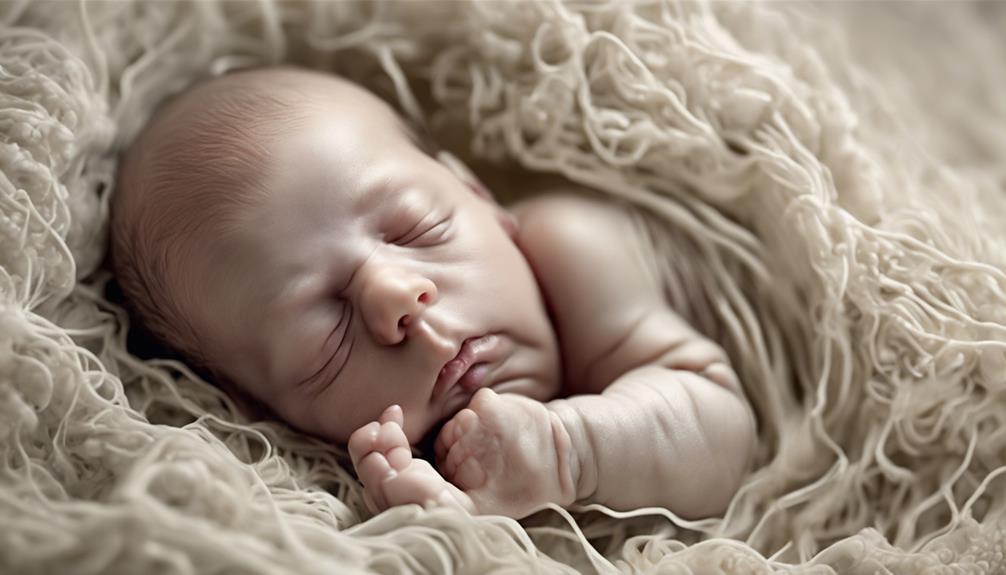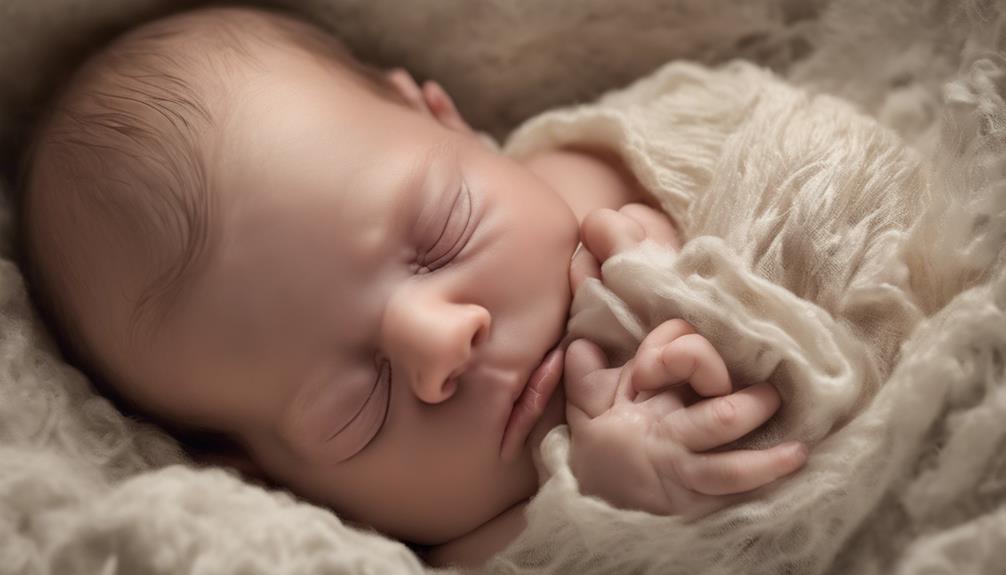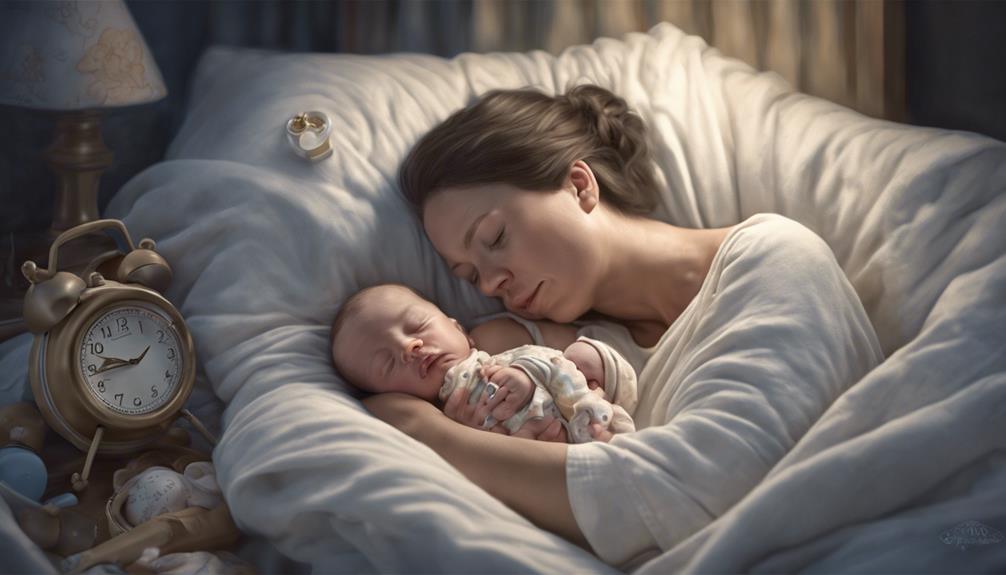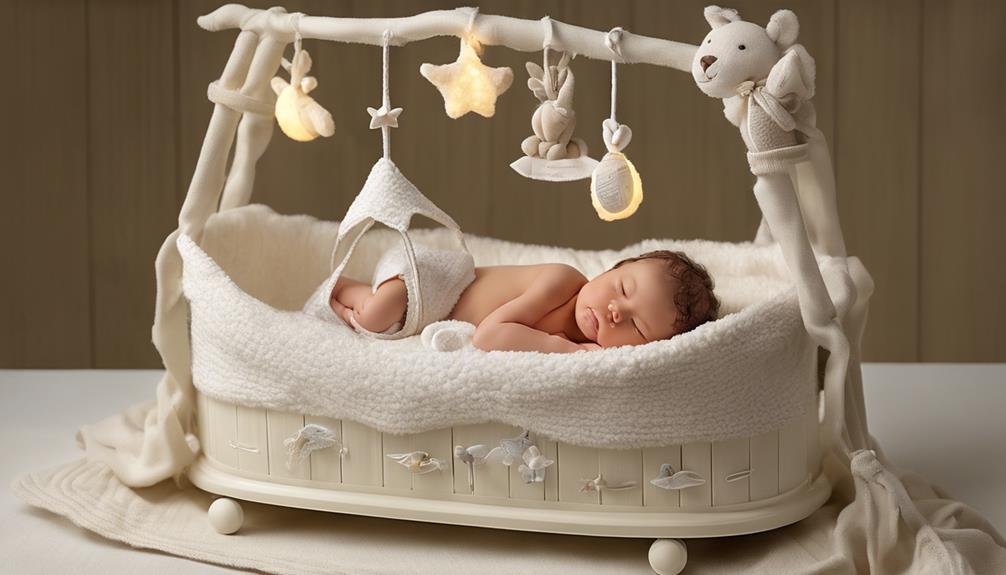As we delve into the fascinating world of newborns twitching in their sleep, one can’t help but ponder the reasons behind this seemingly mysterious phenomenon. The gentle movements and twitches that adorn a sleeping baby’s small body may carry more importance than one might think.
Could these involuntary motions be a window into the intricate workings of a developing nervous system and the complex dance between brain activity and dreams?
Let's unravel the enigma together and uncover the five key factors contributing to newborns' twitching slumbers.
Key Takeaways
- Newborn twitching aids sensorimotor skill development through brain and motor skill maturation.
- REM sleep induces muscle twitches, organizing neural pathways for motor skills.
- Involuntary movements during sleep reflect neurological maturation and coordination refinement.
- Twitching in response to internal brain signals helps babies learn muscle control and coordination.

Babysense 7 Baby Sleep Breathing Movement Monitor for Newborn and Infants, No WiFi, Non Wearable, Non Contact Monitor with 2 Under-Mattress Sensors for Full Crib Coverage, FSA Baby Monitor
HSA/FSA APPROVED – Babysense is a highly sensitive device that monitors and detects even the slightest baby's movements…
As an affiliate, we earn on qualifying purchases.
As an affiliate, we earn on qualifying purchases.
Normal Developmental Reflexes
Newborn twitching during sleep signifies an essential aspect of their developmental reflexes, aiding in the exploration and refinement of sensorimotor skills. These involuntary movements, often observed in babies, play an important role in the maturation of their nervous system.
The twitching movements seen during sleep are linked to the developing brain and motor skills of newborns. As babies shift through sleep cycles, these twitches occur more frequently due to the immaturity of their nervous system. The twitches, occurring in various body parts, indicate the coordination efforts of the brain in enhancing motor skills.

Pink Stork Baby Sleep Drops, Naturally Support Sleep Without Melatonin for Infants, Toddlers, and Kids, Aid Sleep with Chamomile and Magnesium, Baby Essentials for Bedtime, 1 oz, 30 Servings
Healthy sleep leads to happy, healthy babies! Pink Stork has delivered the latest addition to our Pink Stork…
As an affiliate, we earn on qualifying purchases.
As an affiliate, we earn on qualifying purchases.
Brain Activity and Dreams

Exploring the connection between newborn twitching during sleep and brain activity sheds light on the intricate neurological processes underlying sensorimotor development and dream formation. During the REM sleep phase, our brains become highly active, leading to vivid dreams and rapid eye movements.
In newborns, this heightened brain activity triggers muscle twitches, indicating the formation of active brain circuits important for sensorimotor development. These muscle twitches help in the organization of neural pathways, allowing the infant's brain to establish connections necessary for motor skills and sensory processing.
As the brain continues to develop, the interaction between brain activity during REM sleep and muscle twitches plays an important role in neurological development. Understanding this correlation provides insight into the complex mechanisms at play as newborns experience the world through their developing senses and begin to form the foundation for future cognitive and physical abilities.

Black and White Baby Books for Newborn – Tummy Time Mirror & Sensory Toys Soft Montessori Toy for Infant Visual Stimulation, Brain Development & Early Learning – High Contrast Toys for 0-6 Months
Stimulate Your Baby’s Senses: This black and white baby book, designed for babies 0-6 months, features high-contrast black…
As an affiliate, we earn on qualifying purchases.
As an affiliate, we earn on qualifying purchases.
Immature Nervous System

How does the immaturity of the nervous system in newborns contribute to their twitching during sleep?
Newborns twitch in their sleep due to their immature nervous system, which is still in the process of developing neural pathways. This twitching aids in the coordination and refinement of movements as the baby's brain and nerves mature over time.
The immature nervous system can lead to spontaneous muscle contractions and twitches during sleep, which are a common part of neurological development in newborns. These involuntary movements occur as a result of immature nerve connections and brain signaling, causing the newborn to exhibit twitching movements during sleep cycles.
Despite the appearance of twitching, it's important to understand that this is typically harmless and signifies the developing neurological system at work. Witnessing newborn twitching in sleep is a common occurrence and part of the intricate process of neurological maturation.

FISHER-PRICE BABY Toy Soothe 'n Snuggle Otter Portable Plush Sound Machine with Music Lights & Breathing Motion for Newborns 0+ Months
The #1 infant plush in the world*, this sound machine and musical toy otter features soothing breathing motion,…
As an affiliate, we earn on qualifying purchases.
As an affiliate, we earn on qualifying purchases.
Involuntary Muscle Movements

Involuntary muscle movements, commonly referred to as twitches, play an important role in the development of a newborn's sensorimotor system. These twitches are a fascinating aspect of a baby's sleep cycle, reflecting underlying neurological processes. Here are some insights into why these muscle movements occur:
- NREM Sleep: Twitches primarily occur during Non-Rapid Eye Movement (NREM) sleep, which is vital for memory consolidation and brain development in infants.
- Myoclonus: These sudden muscle contractions, known as myoclonus, are believed to help the baby's brain map out connections to different muscle groups.
- Body Integration: Twitches involve various parts of the body, aiding in the coordination and integration of movements essential for motor skills development.
- Research Findings: Researchers suggest that observing and understanding these twitches can offer valuable insights into the baby's sensorimotor development and overall neurological health.
Stimuli Response During Sleep

During newborn sleep cycles, what stimuli elicit responses that trigger muscle contractions and twitches?
Newborn twitching during sleep is often a result of stimuli response, including internal brain signals and sensorimotor development. These twitches, known as benign sleep myoclonus, are a vital part of a baby's brain activity during sleep cycles.
As the brain processes information and experiences, it may manifest these movements as twitches in newborns. These responses play an important role in the development of the baby's sensorimotor skills, helping them learn to control their muscles and coordinate movements.
While it may seem concerning to see your newborn twitching during sleep, it's generally harmless and indicates a healthy nervous system. Understanding that these twitches are a natural part of your baby's neurological development can provide reassurance and insight into the intricate workings of their growing brain.
Frequently Asked Questions
Is It Normal for Newborn to Twitch in Sleep?
Yes, it's completely normal for newborns to twitch in sleep. This behavior is a sign of their developing nervous systems and sensorimotor coordination. It's a natural part of their growth and brain development process.
Is It Normal for Newborns to Have Jerky Movements While Sleeping?
We've noticed newborns having jerky movements while sleeping. It's normal as their nervous system develops. These twitches show brain maturation and aid sensorimotor growth. Understanding this link is important for early issue detection.
Why Does My Newborn Move a Lot While Sleeping?
We move a lot while sleeping due to our developing nervous system, which leads to spontaneous muscle twitches. These twitches are normal in newborns and aid in sensorimotor development, involving symmetrical movements in various body parts.
How Do I Know if My Baby Has Infantile Spasms?
We monitor newborns for sudden, repeated muscle contractions akin to a 'jackknife' motion, suggestive of infantile spasms. Early detection through observing movements and EEG helps diagnose this seizure disorder significantly. Treatment is essential to prevent developmental delays and complications.
Are Twitching and Laughing During Sleep Normal Behaviors for Newborns?
Yes, it is normal for newborns to twitch and even laugh during sleep. The mystery of infant laughter during sleep has fascinated researchers for years. These movements and sounds are often a part of the baby’s developing nervous system and are generally nothing to worry about.
Conclusion
Just as a delicate flower blooms and sways in the gentle breeze, newborns twitch in their sleep as their brains blossom and develop. These tiny movements are like the whispers of nature, signaling the intricate dance of sensorimotor growth and dreams.
Like a symphony of growth, each twitch paints a beautiful picture of the intricate connections being woven in the tapestry of a newborn's developing nervous system. Embrace these twitches as the delicate brushstrokes of a masterpiece in progress.









